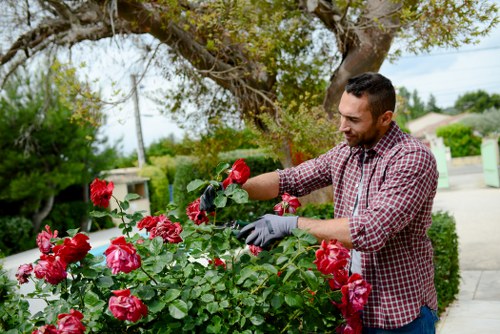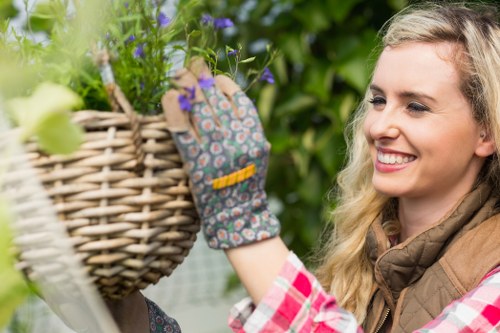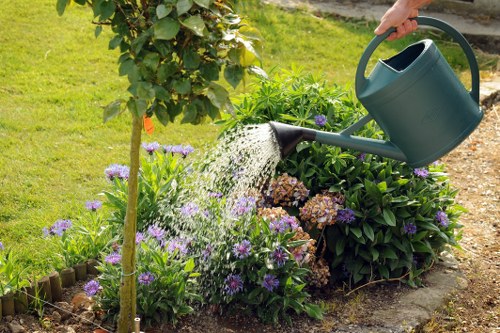Garden Maintenance in Ilford

Maintaining a beautiful garden in Ilford requires a blend of passion, knowledge, and consistent care. Whether you're a seasoned gardener or just starting, understanding the specific needs of your garden can make all the difference. This article delves into the essential aspects of garden maintenance tailored for Ilford's unique climate and soil conditions.
Ilford, located in the heart of East London, boasts a temperate climate that is generally favorable for a wide variety of plants. However, factors such as urban pollution, limited space, and seasonal changes present unique challenges. Effective garden maintenance strategies can help overcome these obstacles, ensuring your garden remains vibrant and healthy throughout the year.
From soil preparation and plant selection to pest control and seasonal tasks, each element plays a crucial role in the overall health of your garden. Let's explore these components in detail to help you cultivate a thriving outdoor space.
Understanding Ilford’s Climate

Ilford experiences a temperate maritime climate, characterized by mild winters and cool summers. The average annual rainfall is moderate, providing sufficient moisture for most garden plants. However, the urban environment can lead to microclimates within your garden, affecting temperature and humidity levels.
Understanding these climatic nuances is essential for selecting the right plants and planning your garden layout. For instance, areas that receive more sunlight may be suitable for sun-loving plants, while shadier spots might be ideal for shade-tolerant varieties.
Additionally, seasonal variations in temperature and precipitation necessitate specific maintenance practices to protect plants and promote healthy growth. Preparing your garden for the changing seasons can help mitigate potential issues and extend the blooming period of your plants.
Soil Preparation and Health

The foundation of any successful garden is healthy soil. In Ilford, the soil can vary from clay to loamy, each possessing distinct characteristics that influence plant growth. Testing your soil's pH and nutrient levels is a crucial first step in soil preparation.
Amending the soil with organic matter such as compost or well-rotted manure can improve its structure, drainage, and fertility. Regularly adding compost not only enhances soil health but also promotes beneficial microbial activity, which is vital for plant nutrient uptake.
Mulching is another essential practice that helps retain soil moisture, suppress weeds, and regulate soil temperature. Organic mulches like bark, straw, or leaf mold gradually decompose, enriching the soil and supporting sustainable garden practices.
Plant Selection and Diversity

Selecting the right plants is paramount to creating a resilient and aesthetically pleasing garden. Choose plants that are well-suited to Ilford's climate, soil type, and the specific conditions of your garden space, such as light exposure and moisture levels.
Incorporate a mix of native and non-native species to enhance biodiversity and ecological balance. Native plants are particularly beneficial as they are adapted to the local environment, require less maintenance, and support local wildlife.
Diversity in plant selection also promotes resistance to pests and diseases. By avoiding monocultures and varying plant types, you reduce the risk of widespread infestations and contribute to a more robust garden ecosystem.
Pruning and Trimming Techniques

Regular pruning and trimming are essential for maintaining plant health and encouraging vigorous growth. Proper pruning techniques vary depending on the plant species and the desired outcome, such as shaping, removing dead or diseased branches, or promoting flowering.
In Ilford's climate, the best time for pruning most deciduous plants is during the late winter or early spring before new growth begins. For spring-flowering shrubs, pruning immediately after blooming ensures that you do not remove next year's buds.
Always use clean, sharp tools to make precise cuts, minimizing damage to the plants. Learning the specific pruning needs of your garden's flora will help you maintain their beauty and health effectively.
Watering Practices
Proper watering is a cornerstone of effective garden maintenance. Ilford's climate generally provides adequate rainfall, but supplemental watering may be necessary during dry spells, especially for container plants and young seedlings.
Implementing efficient watering systems, such as drip irrigation or soaker hoses, can conserve water and deliver moisture directly to the plant roots, reducing evaporation and runoff. Early morning watering is ideal as it allows plants to absorb moisture before the heat of the day and minimizes the risk of fungal diseases.
Monitoring soil moisture levels and adjusting your watering schedule based on weather conditions ensures that your plants receive the right amount of water without overwatering, which can lead to root rot and other issues.
Pest and Disease Management
Garden pests and diseases can wreak havoc on your plants if not managed promptly and effectively. Integrated Pest Management (IPM) is a sustainable approach that combines biological, cultural, and chemical methods to control pest populations while minimizing environmental impact.
Encourage beneficial insects like ladybugs and lacewings that naturally prey on common garden pests. Regularly inspect plants for signs of pests or diseases, such as discolored leaves, holes, or unusual growth patterns, and take immediate action if issues are detected.
Using organic pesticides and fungicides can help manage outbreaks without harming beneficial organisms or contaminating the soil. Maintaining garden hygiene by removing dead plant material and weeds also reduces the likelihood of pest infestations and disease spread.
Seasonal Garden Tasks
Each season brings its own set of garden maintenance tasks that are crucial for the health and appearance of your garden in Ilford. Staying on top of these tasks ensures that your garden remains vibrant and resilient throughout the year.
Spring: Focus on planting new annuals and perennials, pruning shrubs, and preparing beds by adding compost. It's also the time to apply fertilizers to support new growth.
Summer: Maintain consistent watering schedules, deadhead spent flowers, and monitor for pests and diseases. Mulching can help retain moisture and suppress weeds during the hotter months.
Autumn: Clean up fallen leaves, plant spring-blooming bulbs, and protect sensitive plants from the coming cold. It's also a good time to divide and transplant perennials.
Winter: Prune deciduous trees and shrubs, protect plants from frost, and plan for the next growing season. Maintaining garden tools and structures during this period can also save time and effort in the spring.
Tools and Equipment for Garden Maintenance
Having the right tools and equipment makes garden maintenance more efficient and enjoyable. Essential tools for garden maintenance in Ilford include:
- Pruning Shears: For precise cutting of branches and stems.
- Garden Fork and Spade: Useful for soil preparation and digging.
- Watering Equipment: Such as hoses, watering cans, or drip irrigation systems.
- Loppers: For cutting thicker branches that are out of reach with pruning shears.
- Garden Gloves: To protect your hands while working.
Investing in quality tools can enhance your efficiency and reduce the physical strain of garden maintenance tasks. Regularly maintaining your tools, such as cleaning and sharpening blades, ensures they remain effective and last longer.
Eco-Friendly Garden Practices
Adopting eco-friendly practices in your garden not only benefits the environment but also promotes a healthier and more sustainable garden. Here are some green gardening tips for Ilford:
- Composting: Recycle kitchen scraps and garden waste into nutrient-rich compost to enhance soil fertility.
- Rainwater Harvesting: Collect and store rainwater for irrigation, reducing reliance on tap water.
- Organic Gardening: Use natural fertilizers and pest control methods to minimize chemical usage.
- Native Planting: Select native species that require less maintenance and support local biodiversity.
- Waste Reduction: Reuse and recycle materials in your garden, such as using old containers for planters.
Implementing these practices contributes to a more resilient garden ecosystem, conserving resources and reducing your environmental footprint.
Professional Garden Maintenance Services
While many garden maintenance tasks can be handled independently, enlisting professional services in Ilford can provide expertise and save you time. Professional gardeners offer a range of services, including:
- Regular Lawn Care: Mowing, edging, and fertilizing to maintain a lush and healthy lawn.
- Planting and Landscaping: Designing and planting gardens that complement your property's aesthetics and functionality.
- Pest and Disease Control: Identifying and treating pest infestations and plant diseases effectively.
- Seasonal Maintenance: Preparing your garden for seasonal changes with tasks like pruning, mulching, and planting bulbs.
- Garden Renovation: Revitalizing neglected or overgrown gardens to restore their beauty and order.
Hiring professionals ensures that your garden receives specialized care, leveraging their knowledge and experience to achieve optimal results.
DIY vs. Professional Maintenance
Deciding between DIY garden maintenance and hiring professionals depends on various factors, including your expertise, time availability, and the complexity of your garden. Here are some considerations to help you make an informed choice:
- Expertise: Professionals bring specialized knowledge that can be invaluable for complex gardening challenges.
- Time: If your schedule is tight, outsourcing maintenance tasks can ensure your garden remains well-kept without overburdening you.
- Cost: While DIY can be cost-effective, investing in professional services may save money in the long run by preventing costly mistakes.
- Personal Enjoyment: Gardening can be a fulfilling hobby, and some may prefer the hands-on approach to foster a deeper connection with their garden.
Often, a combination of DIY efforts and professional assistance provides the best balance, allowing you to enjoy gardening while ensuring that critical tasks are handled expertly.
Gardening Tips for Year-Round Beauty
Maintaining a garden that looks stunning all year round requires strategic planning and care. Here are some tips to ensure continuous beauty in your Ilford garden:
- Plant Seasonal Flowers: Choose a variety of flowers that bloom in different seasons to maintain color and interest throughout the year.
- Incorporate Evergreens: Evergreen plants provide structure and greenery even in the colder months.
- Use Layers: Planting in layers with tall, medium, and low-growing plants creates depth and visual appeal.
- Include Foliage Plants: Plants with attractive foliage add texture and interest, especially when flowers are not in season.
- Add Hardscaping Elements: Features like pathways, benches, and sculptures enhance the garden's aesthetics and functionality.
By thoughtfully selecting plants and garden features, you can create a space that remains visually appealing and inviting throughout the year.
Sustainable Gardening Practices
Sustainability in gardening involves practices that are environmentally friendly and resource-efficient. Embracing sustainable gardening methods in Ilford can lead to a healthier garden and a positive impact on the surrounding ecosystem.
Here are some sustainable practices to consider:
- Reduce Chemical Use: Opt for organic fertilizers and natural pest control methods to minimize chemical runoff and soil contamination.
- Conserve Water: Implement water-saving techniques such as mulching, rainwater harvesting, and using drought-resistant plants.
- Promote Biodiversity: Incorporate a diverse range of plants to support various wildlife species and create a balanced ecosystem.
- Recycle and Reuse: Utilize recycled materials for garden structures and repurpose household items as planters or decorations.
- Compost: Turn organic waste into compost to enrich the soil and reduce landfill contributions.
Adopting these practices not only benefits your garden but also contributes to broader environmental sustainability efforts.
Conclusion
Garden maintenance in Ilford is a rewarding endeavor that blends creativity, knowledge, and dedication. By understanding the local climate, preparing the soil, selecting appropriate plants, and implementing sustainable practices, you can cultivate a thriving garden that enhances your property's beauty and provides a sanctuary for relaxation.
Whether you choose to maintain your garden independently or enlist professional services, the key to success lies in consistent care and a passion for nurturing your outdoor space. Embrace the joys of gardening and watch your Ilford garden flourish throughout the seasons.
Contact us today to discover how our professional garden maintenance services can transform your Ilford garden into a stunning and well-maintained oasis. Book your service now.

